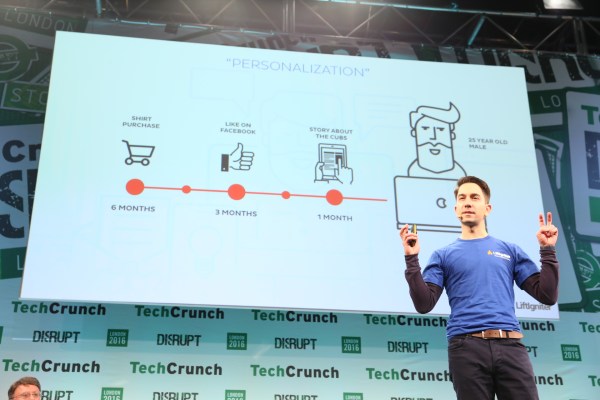You’ve probably had the experience of going to a website and seeing a lot of content that’s not really relevant. For the most part, a lot of this is organized in a way that’s either pre-defined or based on a limited number of signals that aims to sort of personalize the experience for a normal user.
But as time goes on and the competition for eyeballs continues to heat up, that light level of personalization probably won’t be enough. Instead, users can go to Facebook or Amazon, which have an enormous amount of data on its users, to get a much more personalized experience. Every other site that wants the attention of users needs to have a better-curated experience, and that’s what LiftIgniter is hoping to help those sites achieve. The company is raising $6.4 million in a round led by Storm Ventures. LiftIgniter has raised $8.25 million to date and was a finalist at TechCrunch Disrupt London 2016.
The goal is that the software will help customize the content on any given page for a specific user, which, hopefully, makes their experience more enjoyable. Those users may then end up either coming back over and over or eventually converting to customers and buying products. It’s all designed to create a more engaging experience, which in the end will help drive additional business to these sites through either more customer conversions or simply more unique visits and page views. LiftIgniter services more than 5 billion page views a month, co-founder Adam Spector said.
“Our view is that there should be a personalization API, just like there’s an API for text messages with Twilio or payments with Stripe,” Spector said. “Every digital property should have personalization built in. Media, e-commerce, enterprise, business-to-business SaaS, it doesn’t matter. If you create an experience for users, you should want to give them something they want. The only way to do that at scale is with machine learning.”
Emphasized by co-founder Indraneel Mukherjee and Spector, “machine learning” part is important because the signals that users give to various websites are going to constantly be changing. As more and more users feed more and more data to the internet, having a truly engaging and personalized experience is table stakes to keep someone’s attention. A lot of companies will claim to be AI companies, but Spector says LiftIgniter has its own flavor that looks at a ton of signals that help define a profile of a user. Each signal is dependent on the last, and it’s the sum of those signals — all closely intertwined — that determines the user’s experience.
“Our customers’ websites are living and breathing things, and the connections between every piece of content is changing,” Spector said. “The articles you write today could be super relevant to an article that’s five years old. The relevance may change over time. The world is constantly in flux, the idea of having a hard-coded, static list of connections doesn’t make sense.”
A product like LiftIgniter certainly makes sense: you probably won’t be able to manually update your site fast enough to suit your specific visitors’ needs — especially for each individual user. But the sum of all those individual users is what will drive business, whether that’s through advertising views or purchases. Instead of manually curating a site or a shopping experience and hoping for the best, LiftIgniter tries to convince companies that it can do it at a technical level and drive results immediately.
And that’s one of the core elements of the company. LiftIgniter aims to ensure that the companies are able to get some meaningful metrics of success within 30 days of deploying it. That’s key for many companies, which are looking for some kind of return on any services they employ but may not necessarily get them right away. If you’re going to A/B test and try to personalize your site in order to get users to engage with it more, you’ll want to figure out if the service is actually going to be successful. That means that the companies can, early on, define various objectives and LiftIgniter will try to determine whether it’s able to hit those kinds of targets.
It’s going to be a crowded space — with plenty of competition from companies like Google — as companies race to build these kinds of products for companies. They’re going to become mission-critical tools for the rest of the world going forward as Facebook and other services train users to become completely accustomed to very personalized content. LiftIgniter hopes that creating a sort of blanket tool that any site can employ, as well as very quickly demonstrating some success, will give it a competitive edge to survive.
“We’re literally diverging from ourselves in every moment,” Spector said. “Humans adjust to a changing environment well. Our goals are going to be able to adjust for that and give users what they want. There’s no way I could consume every article. I should find the article I care about with a minimal amount of effort. Without that, they bounce back to Google, or Facebook, and then we outsource their discovery to Facebook and Google.”
